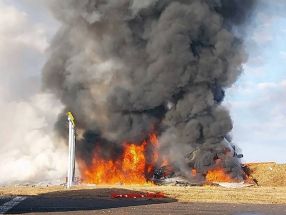French president cheered in Ebola-stricken Guinea
CONAKRY — French President Francois Hollande brought a message of hope to Guinea on Friday, where thousands of residents lined the roads while clapping, drumming and dancing to catch a glimpse of the first Western leader to visit a country hard hit by Ebola.
Guinean President Alpha Conde greeted his French counterpart at the airport and said that if Hollande could visit the country, then anybody could.
"There is hope," said Hollande, "The hope of those who have been cured. The hope that we can control this epidemic ... The very fact that hope exists."
But the French leader also warned that isolation "in a health crisis can become an economic crisis which can set off a political crisis." Guinea is scheduled to have presidential elections next year, and Conde is the first democratically elected president since its independence from France in 1958.
During a visit of about eight hours Hollande toured an Ebola treatment center run by Doctors Without Borders, the principal care provider in the epidemic, and congratulated French and Guinean health workers for their bravery.
At a meeting attended by Conde, Hollande heard updates from aid groups and Guinean and French officials. The room burst out in applause when an Ebola survivor was introduced.
"Ebola is something else. When you do not have Ebola you have a life, you have dreams. When you have Ebola, you are treated like a dead person, even after you are cured," survivor Fanta Camara said. Ebola survivors have been driven from their villages and fired from their jobs as they carry a huge social stigma.
Camara said Ebola had "totally isolated" Guinea but that Hollande "is showing us that we are not alone."
Hollande was to fly Friday night to a summit of Francophone countries in Dakar, Senegal, where he said he would again appeal for international mobilization to fight the epidemic.
Ebola has ravaged three West African countries — Guinea, Liberia and Sierra Leone — and sickened nearly 16,000 people, making it by far the largest Ebola outbreak in history and the first to infect capital cities. It has whipped around populations faster than doctors can keep up, while also hitting remote areas difficult to reach with help.
This has forced a new kind of response: larger treatment centers than ever before seen, but also an increasing need for smaller, stripped-down care centers and rapid-response teams that can be flown into otherwise inaccessible areas. The response has been stymied by the task of transporting potentially infectious blood samples long distances on poor roads.
The UN's World Health Organization last week declared the outbreak in Guinea had "stabilized." It has reported 1,260 deaths from 2,134 cases. Oxfam-France on Thursday, though, said there is little or no reliable information about the epidemic in rural areas.
Nearly a year since the first patient died in a southeastern village of Guinea, at least 25 villages in the country's forested and mountainous southeast still refuse to allow entry by health workers trying to trace potential cases, according to human rights groups at a seminar this week.
The hardest-pressed area in Guinea currently is the southeast town of Macenta, where France helped open a new treatment center this month. French Red Cross official Thomas Mauget said the first cured patient left Thursday, but that the child's mother is still being treated.
He said the center has expanded from 15 to 36 beds in 10 days. Doctors Without Borders said it treated 363 patients in six weeks before it handed the center to the Red Cross on Nov. 18.
President Conde said France has promised to open three more centers.
Neighboring Mali announced one Ebola patient has been cured, Health Minister Ousmane Kone told reporters Friday. Mali has recorded a handful of cases after sick people crossed from Guinea.
Meanwhile, the US ambassador to Liberia said in a telephone interview Friday that a contract will soon be signed to allow Ebola test samples and perhaps even patients to be flown by helicopter out of remote areas. The US military has already airlifted rapid-response teams of epidemiologists and health officials into hard-to-reach areas, but it will not be transporting the blood samples, said Ambassador Deborah Malac.
Infection rates are slowing in Liberia, and the country's government has said it hopes for no new cases by Christmas. Malac cautioned that the disease is unpredictable.
"We're still getting new cases every day," she said. "None of us know for sure what will happen. All we can to do is continue to drive toward zero."
- Latest
- Trending































